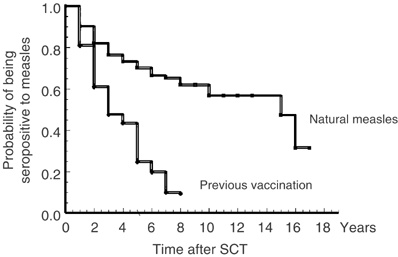"Measles vaccination
Vaccination could be given at 2 years after transplantation if they did not have chronic GVHD or ongoing immunosuppression.8, 9 Most children have been vaccinated, but only few of the adults have been vaccinated. The indications for vaccination in the adults have been seronegativity in a patient either working with children, having young children in the household, or travel to areas where measles is still endemic."
 |
| https://www.nature.com/articles/1704634 Probability of becoming seronegative to measles during follow-up in patients having previously had natural measles disease and in patients having received measles vaccination. |
"Among vaccinated patients, Machado et al. (5) observed that 70% had lost measles immunity 3 years after vaccination, suggesting that serological surveillance to check for immunity should be performed in long-term survivors (Table 2). Moreover, the value and the frequency of booster doses of the vaccine should be better investigated in patients who lost measles immunity.
It is important to stress that although most of the recommendations for BMT recipient vaccination are independent of where in the world the patient lives, there are local variations in the scenario of infections that must be taken into account and adjustments in official guidelines are strongly recommended (31). For example, in 1997, hundreds of BMT recipients were exposed to measles when more than 20,000 cases of measles were diagnosed during an outbreak in the city of São Paulo, Brazil. Eight patients acquired measles and early measles vaccination was the strategy used to avoid the appearance of new measles cases among the patients who had lost specific immunity (5)."
"Conclusions
This study showed that most adult patients lost immunity to MMR after allogeneic HSCT. Although we did not evaluate the safety and efficacy of vaccination in this study, most HSCT guidelines recommend vaccination for HSCT recipients without active chronic graft-versus-host disease or ongoing immunosuppressive therapy at 24 months after HSCT. Immunization against rubella is especially important for female patients of reproductive age. Further studies will be necessary to evaluate the effect of vaccination on the antibody response in adult allogeneic HSCT recipients.
"
Aucun commentaire:
Enregistrer un commentaire